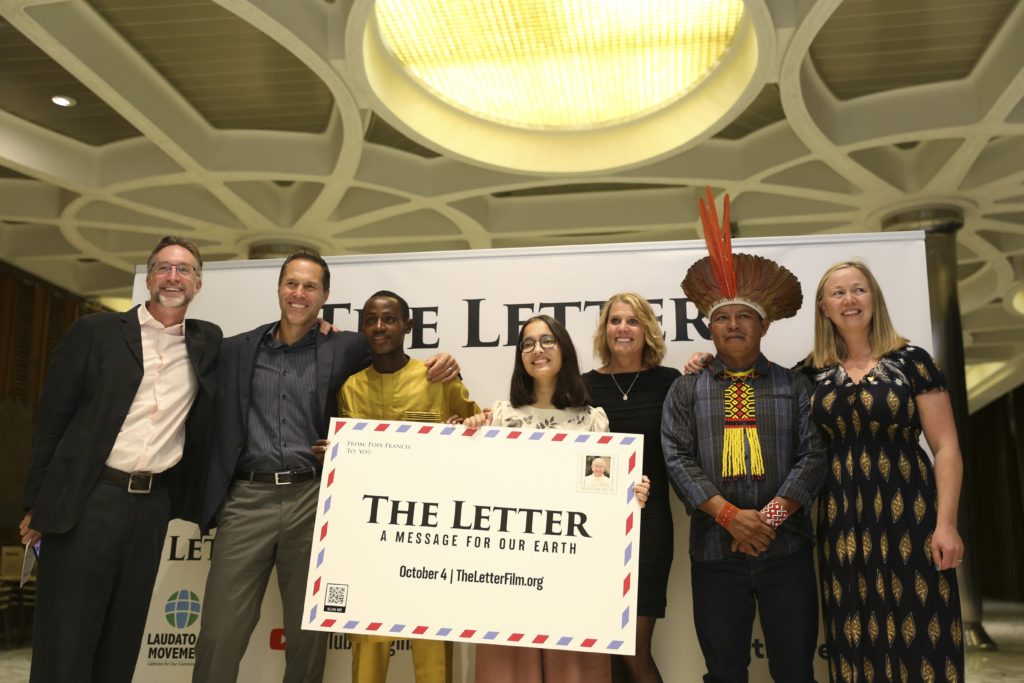Highlighting the church's approach of coupling the power of prayer with active and committed care for the earth, the Vatican wrapped up the monthlong Season of Creation Oct. 4 with the launch of new initiatives.
The feast day of St. Francis of Assisi, patron saint of ecology, marked a new beginning with the Holy See's official entry into the landmark 2015 Paris Agreement and its related U.N. Framework Convention on Climate Change.
A special gathering was held that afternoon at the Casina Pio IV in the Vatican Gardens featuring top Vatican officials, global climate representatives, government leaders and ambassadors to celebrate "this important step taken the Holy See" and to strengthen the international community's commitment to join together for the common good, Cardinal Pietro Parolin, Vatican secretary of state, said after the high-level conference.
"We need to promote and encourage international cooperation now more than ever, particularly at a time when multilateralism is in jeopardy and issues like climate change and the promotion of integral ecology risk being overshadowed by our inability to seek authentic dialogue and consensus," the cardinal said at the global premiere of a documentary inspired by "Laudato Si'," Pope Francis' encyclical letter on caring for creation.
While current challenges are "numerous," many "impressive" initiatives have been created since the letter's publication in 2015, the cardinal said. And it's these efforts and projects like the new film "that help us make this demanding but also stimulating culture of care for our common home into a concrete reality."
Titled, "The Letter: A Message for Our Earth," the film is "a new letter to boost the old letter," Tomás Insua, executive director of the Laudato Si' Movement, said at the premiere.
He spearheaded the idea of inviting an award-winning director to create a visually compelling reminder of the pope's message and to include the voices of those on the peripheries experiencing the urgency of the climate crisis.
In partnership with the Laudato Si' Movement and in collaboration with the Dicastery for Communication and the Dicastery for Promoting Integral Human Development, the film was written and directed by Emmy-winner Nicolas Brown.
Brown told Catholic News Service Oct. 4 that he came into the project "with a lot of prejudice" against people of faith, having "walked away" from his evangelical Christian roots and believing religion and science were at odds.
"When reading Laudato Si', I realized that that perception is wrong and flawed, and so I literally went from being someone who wrote off the faith communities" as having any role to play in the issues of climate change and biodiversity loss to now believing that these problems "cannot be solved without, if not a religious, then a spiritual component," he said.
So much of science and policy focuses on "technocratic aims" and "the how," he said. What has been missing "is the 'why.'"
"That moral foundation that the pope has offered is fundamental and crucial" in deciding values, purpose and behaviors that emphasize responsibility for others and stewardship, he said.
Besides filming during a pandemic, he said, the big challenge was turning a largely philosophical-theological document into a proper story.
Brown said he wanted to mirror the pope's broader message of "getting outside our bubbles" and reaching out to include the voiceless in "this dialogue that the pope so urgently calls for."
The film's protagonists, he said, represent four groups who are paying a steep price for climate change: Chief Cacique Odair "Dadá" Borari from the Amazon rainforest in Brazil to represent Indigenous people; Ridhima Pandey, a 13-year-old climate activist from India to represent young people; Arouna Kandé, a climate refugee from Senegal to represent the poor; and U.S. coral reef scientists Greg Asner and Robin Martin representing wildlife.
For the plot, Brown said he imagined a motif like the one in "The Wonderful Wizard of Oz," in which "we're going to meet the pope" and tell him their challenges, needs and dreams.
After the five follow Rome's cobblestone road to Pope Francis, it's much like meeting the wizard in the children's story, he said. "There's not a lot he can do for you. He gives a fantastic sermon, but at the end of the day, you realize that it's up to you. You have to dig within yourself."
Then, on a whim, he said, he decided to bring the film's protagonists, "who came all this way" to Italy, on to Assisi "to understand more deeply" why the pope chose the name Francis and discover the saint's legacy.
"The real magic of the film actually happens after we meet the pope," Brown said. The activists form an alliance, "a bond that is deeply human and, really, I think is the deeper message of Laudato Si'" where people are moved by compassion after witnessing the crosses others bear.
Lorna Gold, who accompanies the group in the documentary, said at the film's preview that, despite the worsening climate crisis, there is hope "when we come together" to build bridges and alliances.
Gold, who is president of the board of the Laudato Si' Movement, said Pope Francis wanted his encyclical "to reach every person on the planet."
Distributing the film for free on YouTube Originals and TheLetterFilm.org is meant to "bring the letter to new audiences," she said.
People are encouraged to watch it together with others and "create a movement" with dialogue and coordinated action, she said.
Pandey, the young Indian, appealed to premiere-goers, telling them she was proud to be part of the film and an activist, but "I don't run the government and I don't own the factories."
With COP27 coming up this year in Egypt, the U.N. climate change conferences are more than twice her age, she said. "And what's the conclusion? (Leaders) come there with big speeches that, at the very end, no action has been taken."
"Just act now guys, please!" she said.

